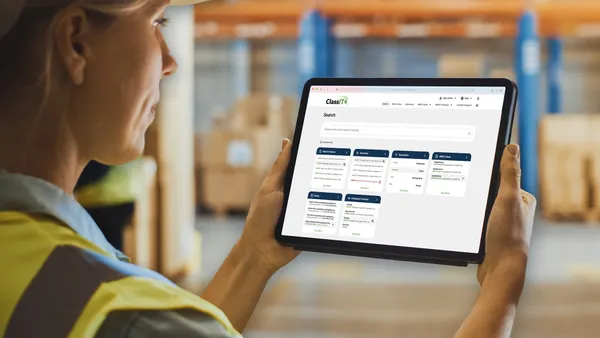Dive Brief:
- One-third of U.S. truck drivers still use paper logs to track hours of service despite the electronic logging device (ELD) mandate, says a new survey with 2,400 respondents from Teletrac Navman a software provider for managing mobile assets.
- ELD adoption is high, but the technology's use is low, the survey states. The respondents — mostly owners, fleet managers, operations managers, and back-office administrators — reported that they see the benefits of ELDs and more advanced telematics analysis, but less than a third are using the data to monitor crucial indicators like fuel usage and maintenance.
- Due to the low adoption rates of more advanced telematics data analytics, fleets are seeing the benefits of data slowly, but the 26% of those who implemented telematics reported fewer accidents and 43% reported some savings on fuel — the largest segment (31%) reporting 5% - 10% savings.
Dive Insight:
The ELD mandate continues to inspire anger and frustration in truckers and fleet managers, but much quieter are the voices of those who see value in the data they produce.
According to the survey, 72% of ELD users see some benefit in the system, although ELDs are also the industry's most prominent compliance concern. The most well-understood benefits were a lower risk of compliance violations, the ability to eliminate manual processes and driver and public safety.
Currently, telematics are being used primarily for tracking the most basic indicators they offer, such as vehicle location, hours of service and speed. Less than half of respondents use telematics to track driver performance, idling, harsh braking and maintenance. Less than a third track fuel usage, jobs completed or engine hours using telematics.
"We're seeing more companies invest in telematics, but unfortunately many are only doing so to check the compliance box, not making the most of the technology to better their businesses," said Sid Nair, senior director of transport and compliance, Teletrac Navman in a statement.
In fact, Nair predicts that underutilizing available data could develop into a business risk. "We're already seeing a widening gap between companies leveraging technology to drive fleet profitability and those who are merely reaping the benefits of the current high demand. Training everyone from drivers to fleet executives on how telematics data can boost operations is key, as the data alone won't drive change," he said.
Another unrealized benefit of telematics is driver retention. The survey suggests that "tech fatigue" possibly caused by the ELD mandate could inhibit recruitment of younger, tech-savvy drivers as 58% of respondents had no plans to implement new tech in 2018. Telematics data can also help managers reward drivers for performance, rather than raise pay across the board to keep drivers on the road (43% of respondents do not reward drivers on performance at all).















